Developing Crosscultural Capabilities
VerifiedAdded on 2023/01/16
|11
|3574
|41
AI Summary
This report discusses the concept of cross culture and its importance in international business. It focuses on Crockett & Jones, a shoe manufacturer, and their business expansion in Ethiopia. The report also analyzes the cultural differences between the UK and Ethiopia using the Hofstede cultural dimension model. It further explores the HR elements that need to be considered for successful business expansion. Get study material and solved assignments on Desklib.
Contribute Materials
Your contribution can guide someone’s learning journey. Share your
documents today.
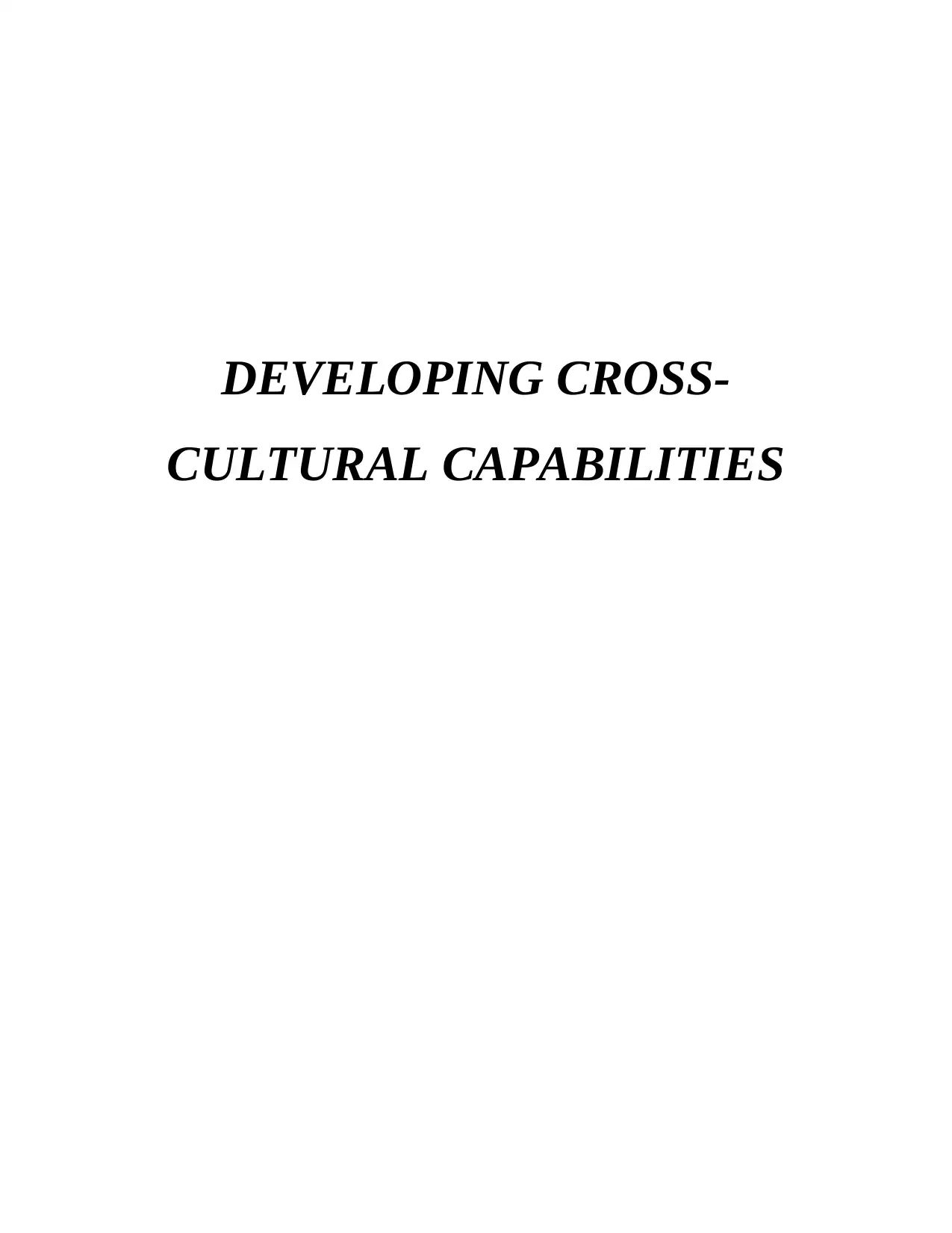
DEVELOPING CROSS-
CULTURAL CAPABILITIES
CULTURAL CAPABILITIES
Secure Best Marks with AI Grader
Need help grading? Try our AI Grader for instant feedback on your assignments.
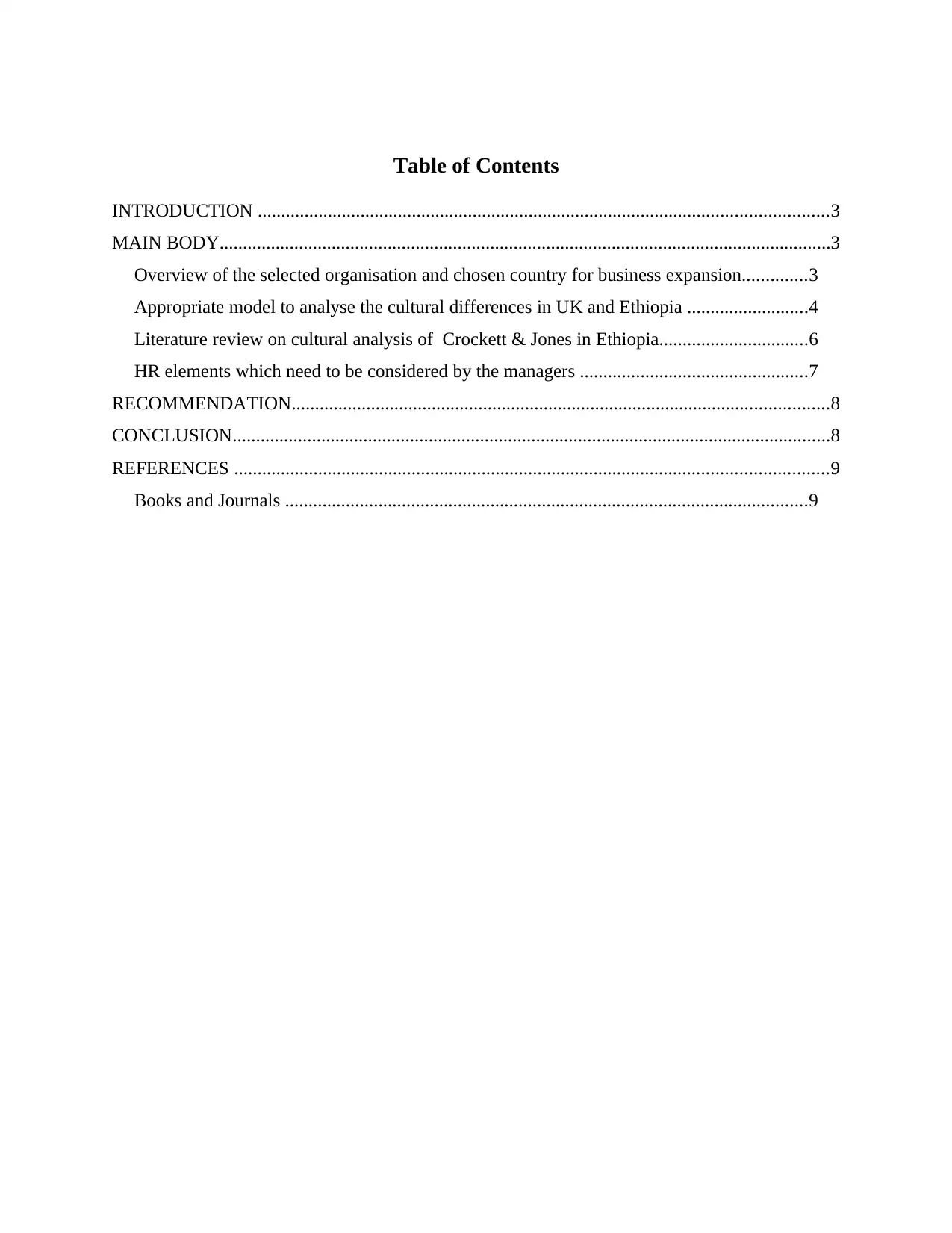
Table of Contents
INTRODUCTION ..........................................................................................................................3
MAIN BODY...................................................................................................................................3
Overview of the selected organisation and chosen country for business expansion..............3
Appropriate model to analyse the cultural differences in UK and Ethiopia ..........................4
Literature review on cultural analysis of Crockett & Jones in Ethiopia................................6
HR elements which need to be considered by the managers .................................................7
RECOMMENDATION...................................................................................................................8
CONCLUSION................................................................................................................................8
REFERENCES ...............................................................................................................................9
Books and Journals ................................................................................................................9
INTRODUCTION ..........................................................................................................................3
MAIN BODY...................................................................................................................................3
Overview of the selected organisation and chosen country for business expansion..............3
Appropriate model to analyse the cultural differences in UK and Ethiopia ..........................4
Literature review on cultural analysis of Crockett & Jones in Ethiopia................................6
HR elements which need to be considered by the managers .................................................7
RECOMMENDATION...................................................................................................................8
CONCLUSION................................................................................................................................8
REFERENCES ...............................................................................................................................9
Books and Journals ................................................................................................................9
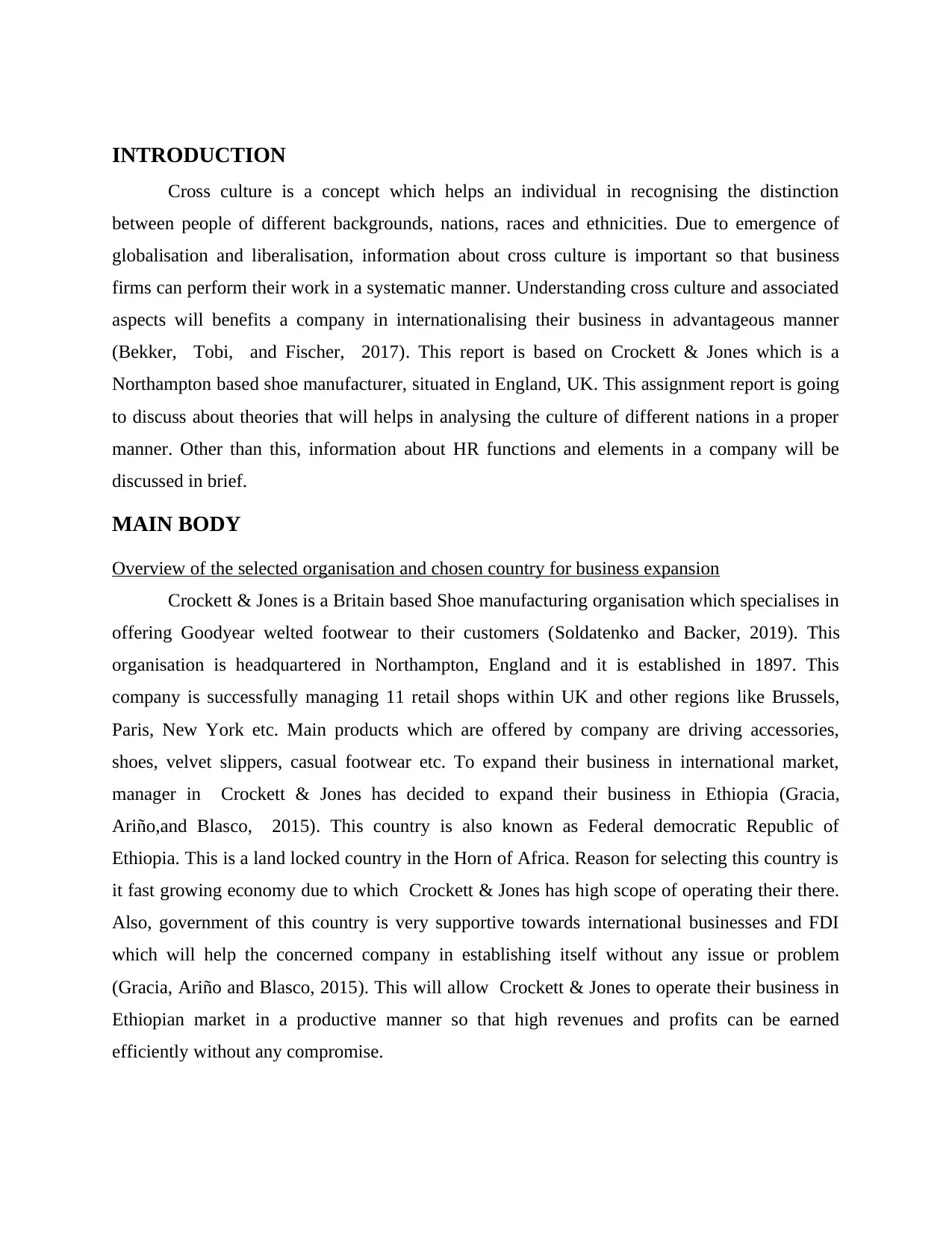
INTRODUCTION
Cross culture is a concept which helps an individual in recognising the distinction
between people of different backgrounds, nations, races and ethnicities. Due to emergence of
globalisation and liberalisation, information about cross culture is important so that business
firms can perform their work in a systematic manner. Understanding cross culture and associated
aspects will benefits a company in internationalising their business in advantageous manner
(Bekker, Tobi, and Fischer, 2017). This report is based on Crockett & Jones which is a
Northampton based shoe manufacturer, situated in England, UK. This assignment report is going
to discuss about theories that will helps in analysing the culture of different nations in a proper
manner. Other than this, information about HR functions and elements in a company will be
discussed in brief.
MAIN BODY
Overview of the selected organisation and chosen country for business expansion
Crockett & Jones is a Britain based Shoe manufacturing organisation which specialises in
offering Goodyear welted footwear to their customers (Soldatenko and Backer, 2019). This
organisation is headquartered in Northampton, England and it is established in 1897. This
company is successfully managing 11 retail shops within UK and other regions like Brussels,
Paris, New York etc. Main products which are offered by company are driving accessories,
shoes, velvet slippers, casual footwear etc. To expand their business in international market,
manager in Crockett & Jones has decided to expand their business in Ethiopia (Gracia,
Ariño,and Blasco, 2015). This country is also known as Federal democratic Republic of
Ethiopia. This is a land locked country in the Horn of Africa. Reason for selecting this country is
it fast growing economy due to which Crockett & Jones has high scope of operating their there.
Also, government of this country is very supportive towards international businesses and FDI
which will help the concerned company in establishing itself without any issue or problem
(Gracia, Ariño and Blasco, 2015). This will allow Crockett & Jones to operate their business in
Ethiopian market in a productive manner so that high revenues and profits can be earned
efficiently without any compromise.
Cross culture is a concept which helps an individual in recognising the distinction
between people of different backgrounds, nations, races and ethnicities. Due to emergence of
globalisation and liberalisation, information about cross culture is important so that business
firms can perform their work in a systematic manner. Understanding cross culture and associated
aspects will benefits a company in internationalising their business in advantageous manner
(Bekker, Tobi, and Fischer, 2017). This report is based on Crockett & Jones which is a
Northampton based shoe manufacturer, situated in England, UK. This assignment report is going
to discuss about theories that will helps in analysing the culture of different nations in a proper
manner. Other than this, information about HR functions and elements in a company will be
discussed in brief.
MAIN BODY
Overview of the selected organisation and chosen country for business expansion
Crockett & Jones is a Britain based Shoe manufacturing organisation which specialises in
offering Goodyear welted footwear to their customers (Soldatenko and Backer, 2019). This
organisation is headquartered in Northampton, England and it is established in 1897. This
company is successfully managing 11 retail shops within UK and other regions like Brussels,
Paris, New York etc. Main products which are offered by company are driving accessories,
shoes, velvet slippers, casual footwear etc. To expand their business in international market,
manager in Crockett & Jones has decided to expand their business in Ethiopia (Gracia,
Ariño,and Blasco, 2015). This country is also known as Federal democratic Republic of
Ethiopia. This is a land locked country in the Horn of Africa. Reason for selecting this country is
it fast growing economy due to which Crockett & Jones has high scope of operating their there.
Also, government of this country is very supportive towards international businesses and FDI
which will help the concerned company in establishing itself without any issue or problem
(Gracia, Ariño and Blasco, 2015). This will allow Crockett & Jones to operate their business in
Ethiopian market in a productive manner so that high revenues and profits can be earned
efficiently without any compromise.
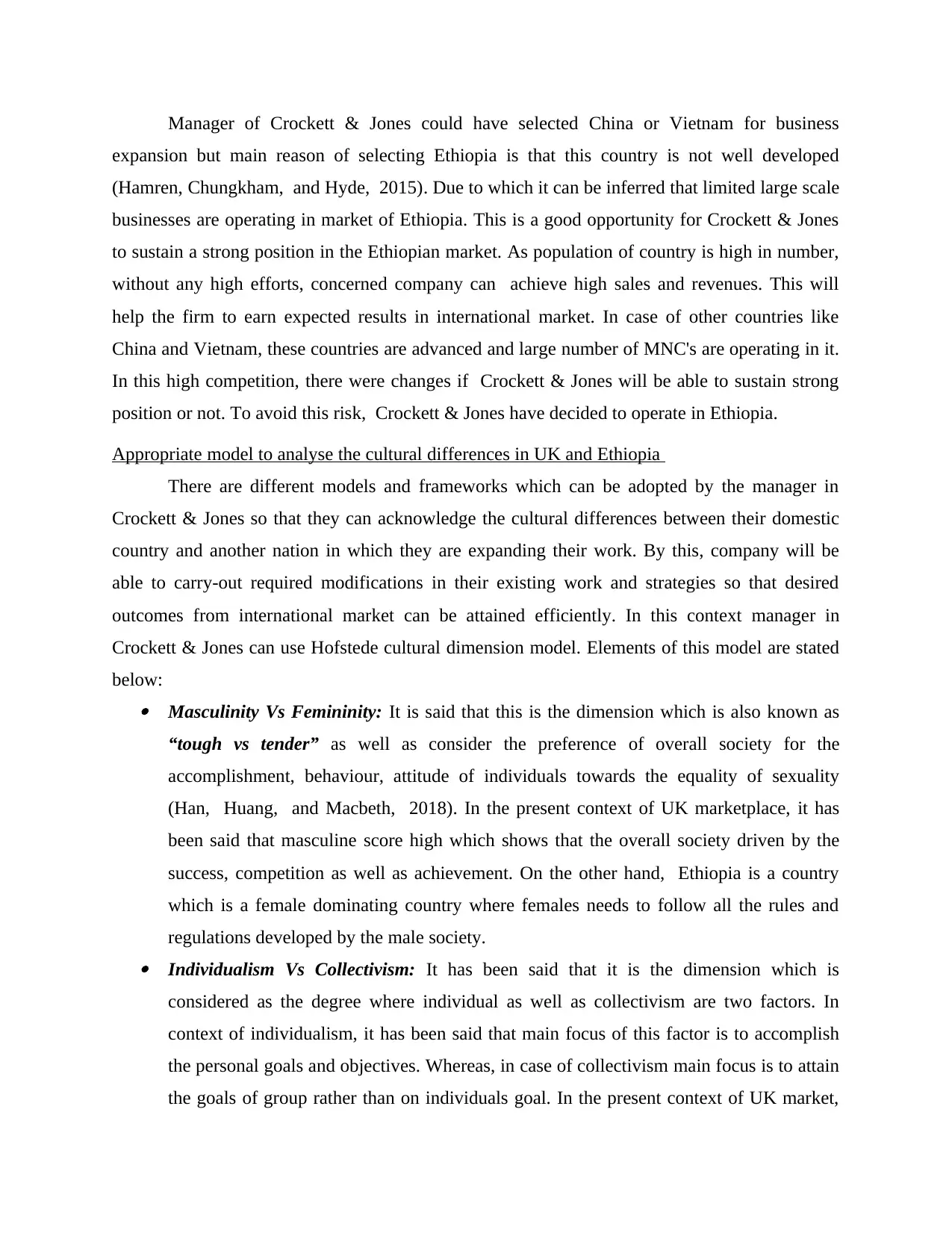
Manager of Crockett & Jones could have selected China or Vietnam for business
expansion but main reason of selecting Ethiopia is that this country is not well developed
(Hamren, Chungkham, and Hyde, 2015). Due to which it can be inferred that limited large scale
businesses are operating in market of Ethiopia. This is a good opportunity for Crockett & Jones
to sustain a strong position in the Ethiopian market. As population of country is high in number,
without any high efforts, concerned company can achieve high sales and revenues. This will
help the firm to earn expected results in international market. In case of other countries like
China and Vietnam, these countries are advanced and large number of MNC's are operating in it.
In this high competition, there were changes if Crockett & Jones will be able to sustain strong
position or not. To avoid this risk, Crockett & Jones have decided to operate in Ethiopia.
Appropriate model to analyse the cultural differences in UK and Ethiopia
There are different models and frameworks which can be adopted by the manager in
Crockett & Jones so that they can acknowledge the cultural differences between their domestic
country and another nation in which they are expanding their work. By this, company will be
able to carry-out required modifications in their existing work and strategies so that desired
outcomes from international market can be attained efficiently. In this context manager in
Crockett & Jones can use Hofstede cultural dimension model. Elements of this model are stated
below: Masculinity Vs Femininity: It is said that this is the dimension which is also known as
“tough vs tender” as well as consider the preference of overall society for the
accomplishment, behaviour, attitude of individuals towards the equality of sexuality
(Han, Huang, and Macbeth, 2018). In the present context of UK marketplace, it has
been said that masculine score high which shows that the overall society driven by the
success, competition as well as achievement. On the other hand, Ethiopia is a country
which is a female dominating country where females needs to follow all the rules and
regulations developed by the male society. Individualism Vs Collectivism: It has been said that it is the dimension which is
considered as the degree where individual as well as collectivism are two factors. In
context of individualism, it has been said that main focus of this factor is to accomplish
the personal goals and objectives. Whereas, in case of collectivism main focus is to attain
the goals of group rather than on individuals goal. In the present context of UK market,
expansion but main reason of selecting Ethiopia is that this country is not well developed
(Hamren, Chungkham, and Hyde, 2015). Due to which it can be inferred that limited large scale
businesses are operating in market of Ethiopia. This is a good opportunity for Crockett & Jones
to sustain a strong position in the Ethiopian market. As population of country is high in number,
without any high efforts, concerned company can achieve high sales and revenues. This will
help the firm to earn expected results in international market. In case of other countries like
China and Vietnam, these countries are advanced and large number of MNC's are operating in it.
In this high competition, there were changes if Crockett & Jones will be able to sustain strong
position or not. To avoid this risk, Crockett & Jones have decided to operate in Ethiopia.
Appropriate model to analyse the cultural differences in UK and Ethiopia
There are different models and frameworks which can be adopted by the manager in
Crockett & Jones so that they can acknowledge the cultural differences between their domestic
country and another nation in which they are expanding their work. By this, company will be
able to carry-out required modifications in their existing work and strategies so that desired
outcomes from international market can be attained efficiently. In this context manager in
Crockett & Jones can use Hofstede cultural dimension model. Elements of this model are stated
below: Masculinity Vs Femininity: It is said that this is the dimension which is also known as
“tough vs tender” as well as consider the preference of overall society for the
accomplishment, behaviour, attitude of individuals towards the equality of sexuality
(Han, Huang, and Macbeth, 2018). In the present context of UK marketplace, it has
been said that masculine score high which shows that the overall society driven by the
success, competition as well as achievement. On the other hand, Ethiopia is a country
which is a female dominating country where females needs to follow all the rules and
regulations developed by the male society. Individualism Vs Collectivism: It has been said that it is the dimension which is
considered as the degree where individual as well as collectivism are two factors. In
context of individualism, it has been said that main focus of this factor is to accomplish
the personal goals and objectives. Whereas, in case of collectivism main focus is to attain
the goals of group rather than on individuals goal. In the present context of UK market,
Secure Best Marks with AI Grader
Need help grading? Try our AI Grader for instant feedback on your assignments.
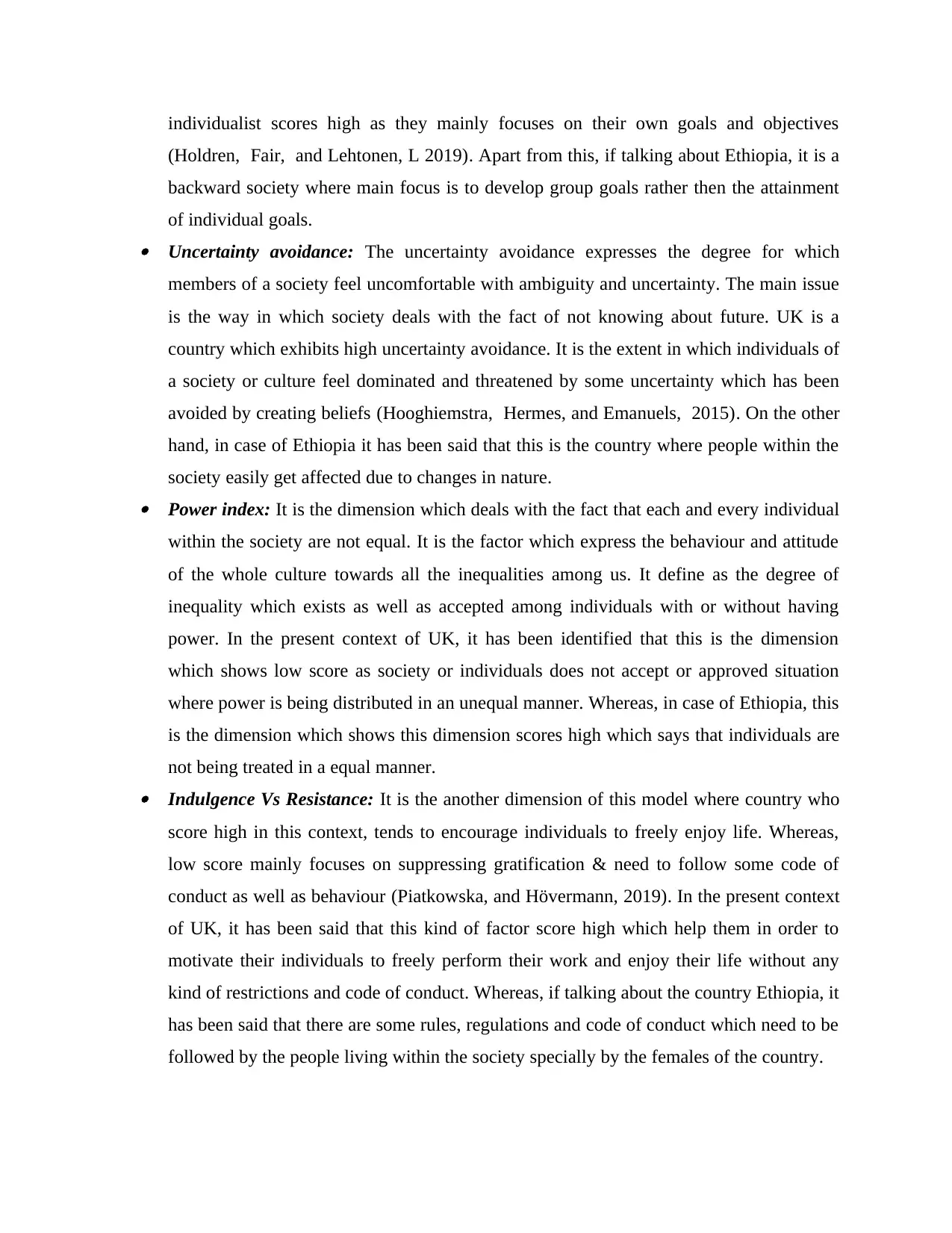
individualist scores high as they mainly focuses on their own goals and objectives
(Holdren, Fair, and Lehtonen, L 2019). Apart from this, if talking about Ethiopia, it is a
backward society where main focus is to develop group goals rather then the attainment
of individual goals. Uncertainty avoidance: The uncertainty avoidance expresses the degree for which
members of a society feel uncomfortable with ambiguity and uncertainty. The main issue
is the way in which society deals with the fact of not knowing about future. UK is a
country which exhibits high uncertainty avoidance. It is the extent in which individuals of
a society or culture feel dominated and threatened by some uncertainty which has been
avoided by creating beliefs (Hooghiemstra, Hermes, and Emanuels, 2015). On the other
hand, in case of Ethiopia it has been said that this is the country where people within the
society easily get affected due to changes in nature. Power index: It is the dimension which deals with the fact that each and every individual
within the society are not equal. It is the factor which express the behaviour and attitude
of the whole culture towards all the inequalities among us. It define as the degree of
inequality which exists as well as accepted among individuals with or without having
power. In the present context of UK, it has been identified that this is the dimension
which shows low score as society or individuals does not accept or approved situation
where power is being distributed in an unequal manner. Whereas, in case of Ethiopia, this
is the dimension which shows this dimension scores high which says that individuals are
not being treated in a equal manner. Indulgence Vs Resistance: It is the another dimension of this model where country who
score high in this context, tends to encourage individuals to freely enjoy life. Whereas,
low score mainly focuses on suppressing gratification & need to follow some code of
conduct as well as behaviour (Piatkowska, and Hövermann, 2019). In the present context
of UK, it has been said that this kind of factor score high which help them in order to
motivate their individuals to freely perform their work and enjoy their life without any
kind of restrictions and code of conduct. Whereas, if talking about the country Ethiopia, it
has been said that there are some rules, regulations and code of conduct which need to be
followed by the people living within the society specially by the females of the country.
(Holdren, Fair, and Lehtonen, L 2019). Apart from this, if talking about Ethiopia, it is a
backward society where main focus is to develop group goals rather then the attainment
of individual goals. Uncertainty avoidance: The uncertainty avoidance expresses the degree for which
members of a society feel uncomfortable with ambiguity and uncertainty. The main issue
is the way in which society deals with the fact of not knowing about future. UK is a
country which exhibits high uncertainty avoidance. It is the extent in which individuals of
a society or culture feel dominated and threatened by some uncertainty which has been
avoided by creating beliefs (Hooghiemstra, Hermes, and Emanuels, 2015). On the other
hand, in case of Ethiopia it has been said that this is the country where people within the
society easily get affected due to changes in nature. Power index: It is the dimension which deals with the fact that each and every individual
within the society are not equal. It is the factor which express the behaviour and attitude
of the whole culture towards all the inequalities among us. It define as the degree of
inequality which exists as well as accepted among individuals with or without having
power. In the present context of UK, it has been identified that this is the dimension
which shows low score as society or individuals does not accept or approved situation
where power is being distributed in an unequal manner. Whereas, in case of Ethiopia, this
is the dimension which shows this dimension scores high which says that individuals are
not being treated in a equal manner. Indulgence Vs Resistance: It is the another dimension of this model where country who
score high in this context, tends to encourage individuals to freely enjoy life. Whereas,
low score mainly focuses on suppressing gratification & need to follow some code of
conduct as well as behaviour (Piatkowska, and Hövermann, 2019). In the present context
of UK, it has been said that this kind of factor score high which help them in order to
motivate their individuals to freely perform their work and enjoy their life without any
kind of restrictions and code of conduct. Whereas, if talking about the country Ethiopia, it
has been said that there are some rules, regulations and code of conduct which need to be
followed by the people living within the society specially by the females of the country.
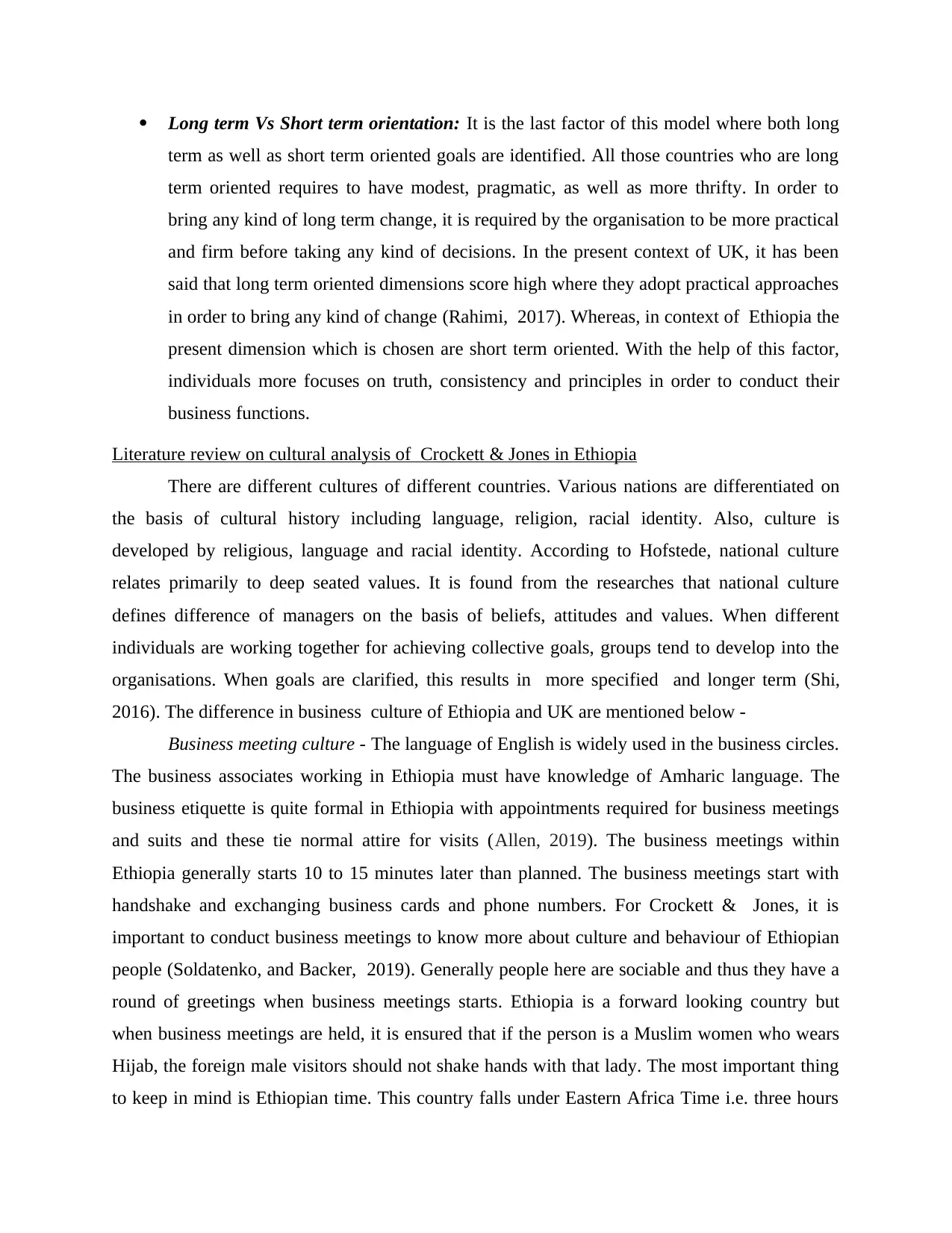
Long term Vs Short term orientation: It is the last factor of this model where both long
term as well as short term oriented goals are identified. All those countries who are long
term oriented requires to have modest, pragmatic, as well as more thrifty. In order to
bring any kind of long term change, it is required by the organisation to be more practical
and firm before taking any kind of decisions. In the present context of UK, it has been
said that long term oriented dimensions score high where they adopt practical approaches
in order to bring any kind of change (Rahimi, 2017). Whereas, in context of Ethiopia the
present dimension which is chosen are short term oriented. With the help of this factor,
individuals more focuses on truth, consistency and principles in order to conduct their
business functions.
Literature review on cultural analysis of Crockett & Jones in Ethiopia
There are different cultures of different countries. Various nations are differentiated on
the basis of cultural history including language, religion, racial identity. Also, culture is
developed by religious, language and racial identity. According to Hofstede, national culture
relates primarily to deep seated values. It is found from the researches that national culture
defines difference of managers on the basis of beliefs, attitudes and values. When different
individuals are working together for achieving collective goals, groups tend to develop into the
organisations. When goals are clarified, this results in more specified and longer term (Shi,
2016). The difference in business culture of Ethiopia and UK are mentioned below -
Business meeting culture - The language of English is widely used in the business circles.
The business associates working in Ethiopia must have knowledge of Amharic language. The
business etiquette is quite formal in Ethiopia with appointments required for business meetings
and suits and these tie normal attire for visits (Allen, 2019). The business meetings within
Ethiopia generally starts 10 to 15 minutes later than planned. The business meetings start with
handshake and exchanging business cards and phone numbers. For Crockett & Jones, it is
important to conduct business meetings to know more about culture and behaviour of Ethiopian
people (Soldatenko, and Backer, 2019). Generally people here are sociable and thus they have a
round of greetings when business meetings starts. Ethiopia is a forward looking country but
when business meetings are held, it is ensured that if the person is a Muslim women who wears
Hijab, the foreign male visitors should not shake hands with that lady. The most important thing
to keep in mind is Ethiopian time. This country falls under Eastern Africa Time i.e. three hours
term as well as short term oriented goals are identified. All those countries who are long
term oriented requires to have modest, pragmatic, as well as more thrifty. In order to
bring any kind of long term change, it is required by the organisation to be more practical
and firm before taking any kind of decisions. In the present context of UK, it has been
said that long term oriented dimensions score high where they adopt practical approaches
in order to bring any kind of change (Rahimi, 2017). Whereas, in context of Ethiopia the
present dimension which is chosen are short term oriented. With the help of this factor,
individuals more focuses on truth, consistency and principles in order to conduct their
business functions.
Literature review on cultural analysis of Crockett & Jones in Ethiopia
There are different cultures of different countries. Various nations are differentiated on
the basis of cultural history including language, religion, racial identity. Also, culture is
developed by religious, language and racial identity. According to Hofstede, national culture
relates primarily to deep seated values. It is found from the researches that national culture
defines difference of managers on the basis of beliefs, attitudes and values. When different
individuals are working together for achieving collective goals, groups tend to develop into the
organisations. When goals are clarified, this results in more specified and longer term (Shi,
2016). The difference in business culture of Ethiopia and UK are mentioned below -
Business meeting culture - The language of English is widely used in the business circles.
The business associates working in Ethiopia must have knowledge of Amharic language. The
business etiquette is quite formal in Ethiopia with appointments required for business meetings
and suits and these tie normal attire for visits (Allen, 2019). The business meetings within
Ethiopia generally starts 10 to 15 minutes later than planned. The business meetings start with
handshake and exchanging business cards and phone numbers. For Crockett & Jones, it is
important to conduct business meetings to know more about culture and behaviour of Ethiopian
people (Soldatenko, and Backer, 2019). Generally people here are sociable and thus they have a
round of greetings when business meetings starts. Ethiopia is a forward looking country but
when business meetings are held, it is ensured that if the person is a Muslim women who wears
Hijab, the foreign male visitors should not shake hands with that lady. The most important thing
to keep in mind is Ethiopian time. This country falls under Eastern Africa Time i.e. three hours
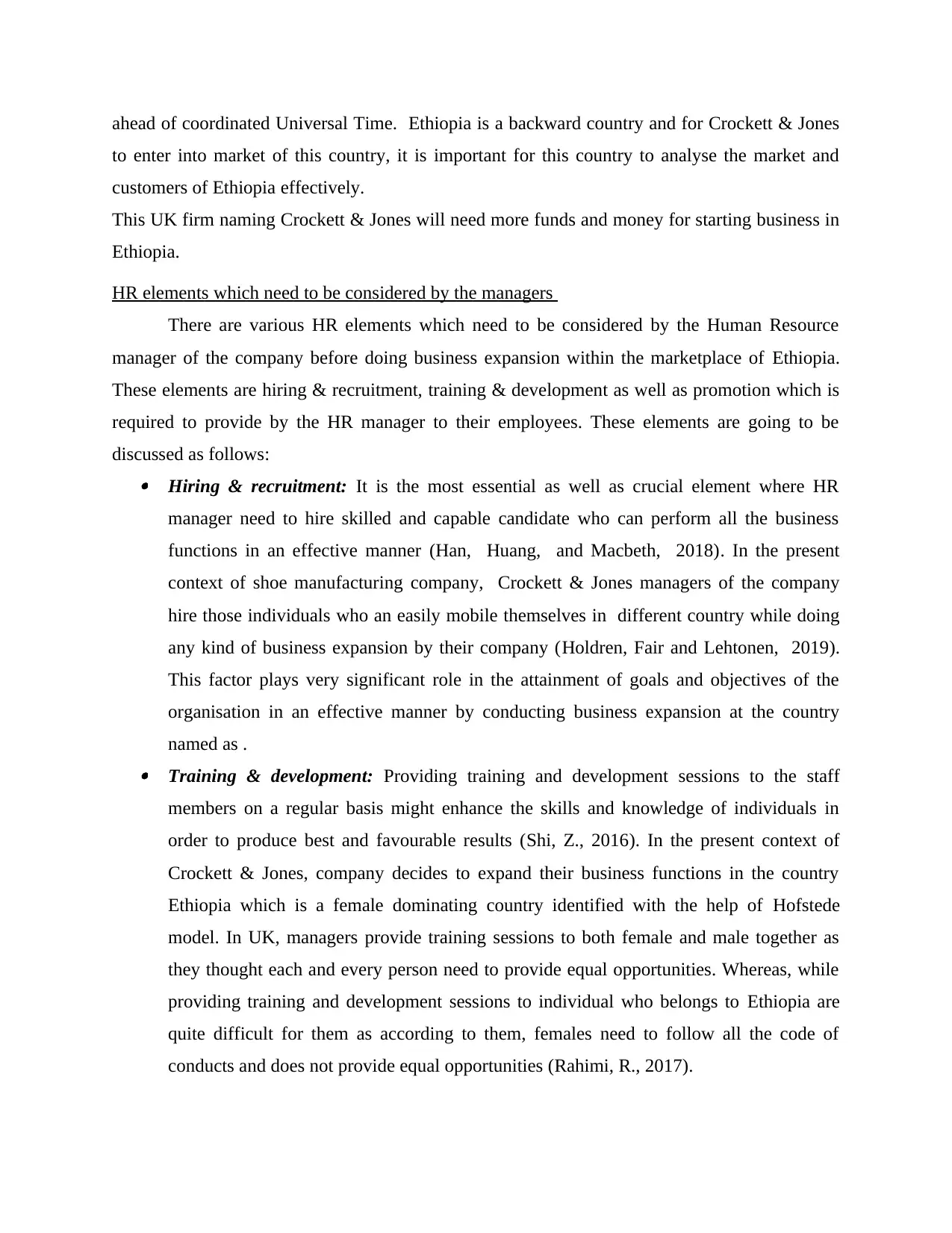
ahead of coordinated Universal Time. Ethiopia is a backward country and for Crockett & Jones
to enter into market of this country, it is important for this country to analyse the market and
customers of Ethiopia effectively.
This UK firm naming Crockett & Jones will need more funds and money for starting business in
Ethiopia.
HR elements which need to be considered by the managers
There are various HR elements which need to be considered by the Human Resource
manager of the company before doing business expansion within the marketplace of Ethiopia.
These elements are hiring & recruitment, training & development as well as promotion which is
required to provide by the HR manager to their employees. These elements are going to be
discussed as follows: Hiring & recruitment: It is the most essential as well as crucial element where HR
manager need to hire skilled and capable candidate who can perform all the business
functions in an effective manner (Han, Huang, and Macbeth, 2018). In the present
context of shoe manufacturing company, Crockett & Jones managers of the company
hire those individuals who an easily mobile themselves in different country while doing
any kind of business expansion by their company (Holdren, Fair and Lehtonen, 2019).
This factor plays very significant role in the attainment of goals and objectives of the
organisation in an effective manner by conducting business expansion at the country
named as . Training & development: Providing training and development sessions to the staff
members on a regular basis might enhance the skills and knowledge of individuals in
order to produce best and favourable results (Shi, Z., 2016). In the present context of
Crockett & Jones, company decides to expand their business functions in the country
Ethiopia which is a female dominating country identified with the help of Hofstede
model. In UK, managers provide training sessions to both female and male together as
they thought each and every person need to provide equal opportunities. Whereas, while
providing training and development sessions to individual who belongs to Ethiopia are
quite difficult for them as according to them, females need to follow all the code of
conducts and does not provide equal opportunities (Rahimi, R., 2017).
to enter into market of this country, it is important for this country to analyse the market and
customers of Ethiopia effectively.
This UK firm naming Crockett & Jones will need more funds and money for starting business in
Ethiopia.
HR elements which need to be considered by the managers
There are various HR elements which need to be considered by the Human Resource
manager of the company before doing business expansion within the marketplace of Ethiopia.
These elements are hiring & recruitment, training & development as well as promotion which is
required to provide by the HR manager to their employees. These elements are going to be
discussed as follows: Hiring & recruitment: It is the most essential as well as crucial element where HR
manager need to hire skilled and capable candidate who can perform all the business
functions in an effective manner (Han, Huang, and Macbeth, 2018). In the present
context of shoe manufacturing company, Crockett & Jones managers of the company
hire those individuals who an easily mobile themselves in different country while doing
any kind of business expansion by their company (Holdren, Fair and Lehtonen, 2019).
This factor plays very significant role in the attainment of goals and objectives of the
organisation in an effective manner by conducting business expansion at the country
named as . Training & development: Providing training and development sessions to the staff
members on a regular basis might enhance the skills and knowledge of individuals in
order to produce best and favourable results (Shi, Z., 2016). In the present context of
Crockett & Jones, company decides to expand their business functions in the country
Ethiopia which is a female dominating country identified with the help of Hofstede
model. In UK, managers provide training sessions to both female and male together as
they thought each and every person need to provide equal opportunities. Whereas, while
providing training and development sessions to individual who belongs to Ethiopia are
quite difficult for them as according to them, females need to follow all the code of
conducts and does not provide equal opportunities (Rahimi, R., 2017).
Paraphrase This Document
Need a fresh take? Get an instant paraphrase of this document with our AI Paraphraser
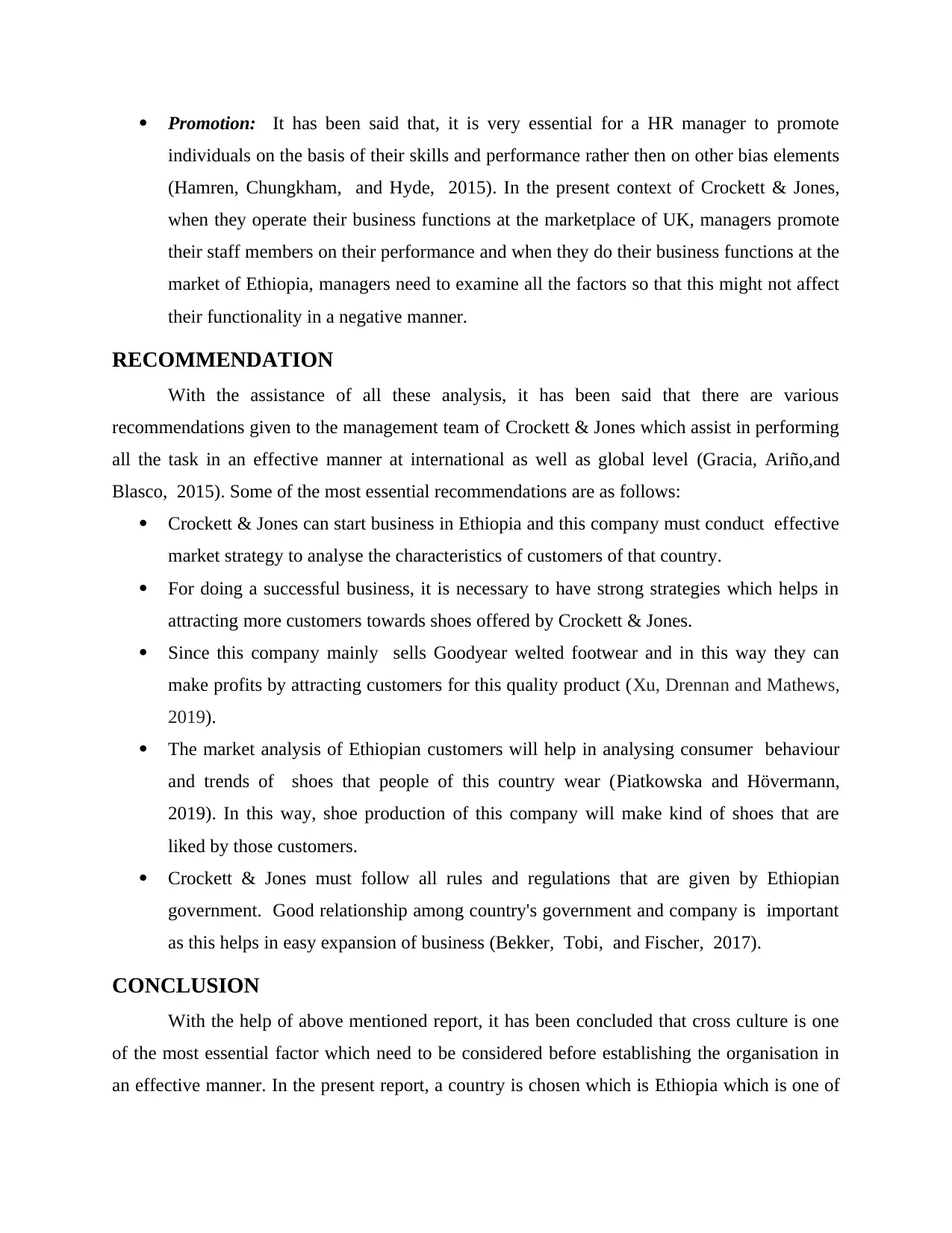
Promotion: It has been said that, it is very essential for a HR manager to promote
individuals on the basis of their skills and performance rather then on other bias elements
(Hamren, Chungkham, and Hyde, 2015). In the present context of Crockett & Jones,
when they operate their business functions at the marketplace of UK, managers promote
their staff members on their performance and when they do their business functions at the
market of Ethiopia, managers need to examine all the factors so that this might not affect
their functionality in a negative manner.
RECOMMENDATION
With the assistance of all these analysis, it has been said that there are various
recommendations given to the management team of Crockett & Jones which assist in performing
all the task in an effective manner at international as well as global level (Gracia, Ariño,and
Blasco, 2015). Some of the most essential recommendations are as follows:
Crockett & Jones can start business in Ethiopia and this company must conduct effective
market strategy to analyse the characteristics of customers of that country.
For doing a successful business, it is necessary to have strong strategies which helps in
attracting more customers towards shoes offered by Crockett & Jones.
Since this company mainly sells Goodyear welted footwear and in this way they can
make profits by attracting customers for this quality product (Xu, Drennan and Mathews,
2019).
The market analysis of Ethiopian customers will help in analysing consumer behaviour
and trends of shoes that people of this country wear (Piatkowska and Hövermann,
2019). In this way, shoe production of this company will make kind of shoes that are
liked by those customers.
Crockett & Jones must follow all rules and regulations that are given by Ethiopian
government. Good relationship among country's government and company is important
as this helps in easy expansion of business (Bekker, Tobi, and Fischer, 2017).
CONCLUSION
With the help of above mentioned report, it has been concluded that cross culture is one
of the most essential factor which need to be considered before establishing the organisation in
an effective manner. In the present report, a country is chosen which is Ethiopia which is one of
individuals on the basis of their skills and performance rather then on other bias elements
(Hamren, Chungkham, and Hyde, 2015). In the present context of Crockett & Jones,
when they operate their business functions at the marketplace of UK, managers promote
their staff members on their performance and when they do their business functions at the
market of Ethiopia, managers need to examine all the factors so that this might not affect
their functionality in a negative manner.
RECOMMENDATION
With the assistance of all these analysis, it has been said that there are various
recommendations given to the management team of Crockett & Jones which assist in performing
all the task in an effective manner at international as well as global level (Gracia, Ariño,and
Blasco, 2015). Some of the most essential recommendations are as follows:
Crockett & Jones can start business in Ethiopia and this company must conduct effective
market strategy to analyse the characteristics of customers of that country.
For doing a successful business, it is necessary to have strong strategies which helps in
attracting more customers towards shoes offered by Crockett & Jones.
Since this company mainly sells Goodyear welted footwear and in this way they can
make profits by attracting customers for this quality product (Xu, Drennan and Mathews,
2019).
The market analysis of Ethiopian customers will help in analysing consumer behaviour
and trends of shoes that people of this country wear (Piatkowska and Hövermann,
2019). In this way, shoe production of this company will make kind of shoes that are
liked by those customers.
Crockett & Jones must follow all rules and regulations that are given by Ethiopian
government. Good relationship among country's government and company is important
as this helps in easy expansion of business (Bekker, Tobi, and Fischer, 2017).
CONCLUSION
With the help of above mentioned report, it has been concluded that cross culture is one
of the most essential factor which need to be considered before establishing the organisation in
an effective manner. In the present report, a country is chosen which is Ethiopia which is one of
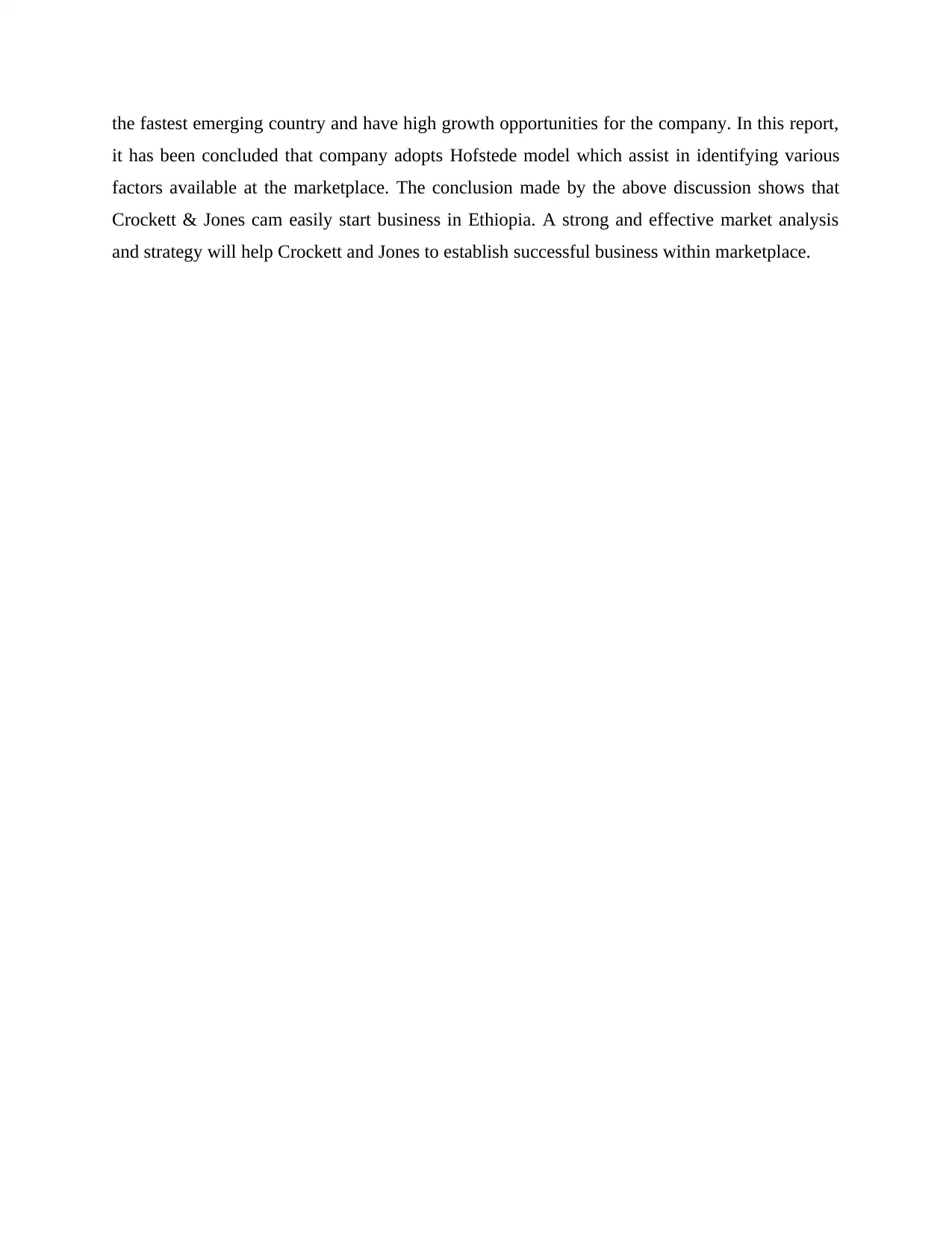
the fastest emerging country and have high growth opportunities for the company. In this report,
it has been concluded that company adopts Hofstede model which assist in identifying various
factors available at the marketplace. The conclusion made by the above discussion shows that
Crockett & Jones cam easily start business in Ethiopia. A strong and effective market analysis
and strategy will help Crockett and Jones to establish successful business within marketplace.
it has been concluded that company adopts Hofstede model which assist in identifying various
factors available at the marketplace. The conclusion made by the above discussion shows that
Crockett & Jones cam easily start business in Ethiopia. A strong and effective market analysis
and strategy will help Crockett and Jones to establish successful business within marketplace.
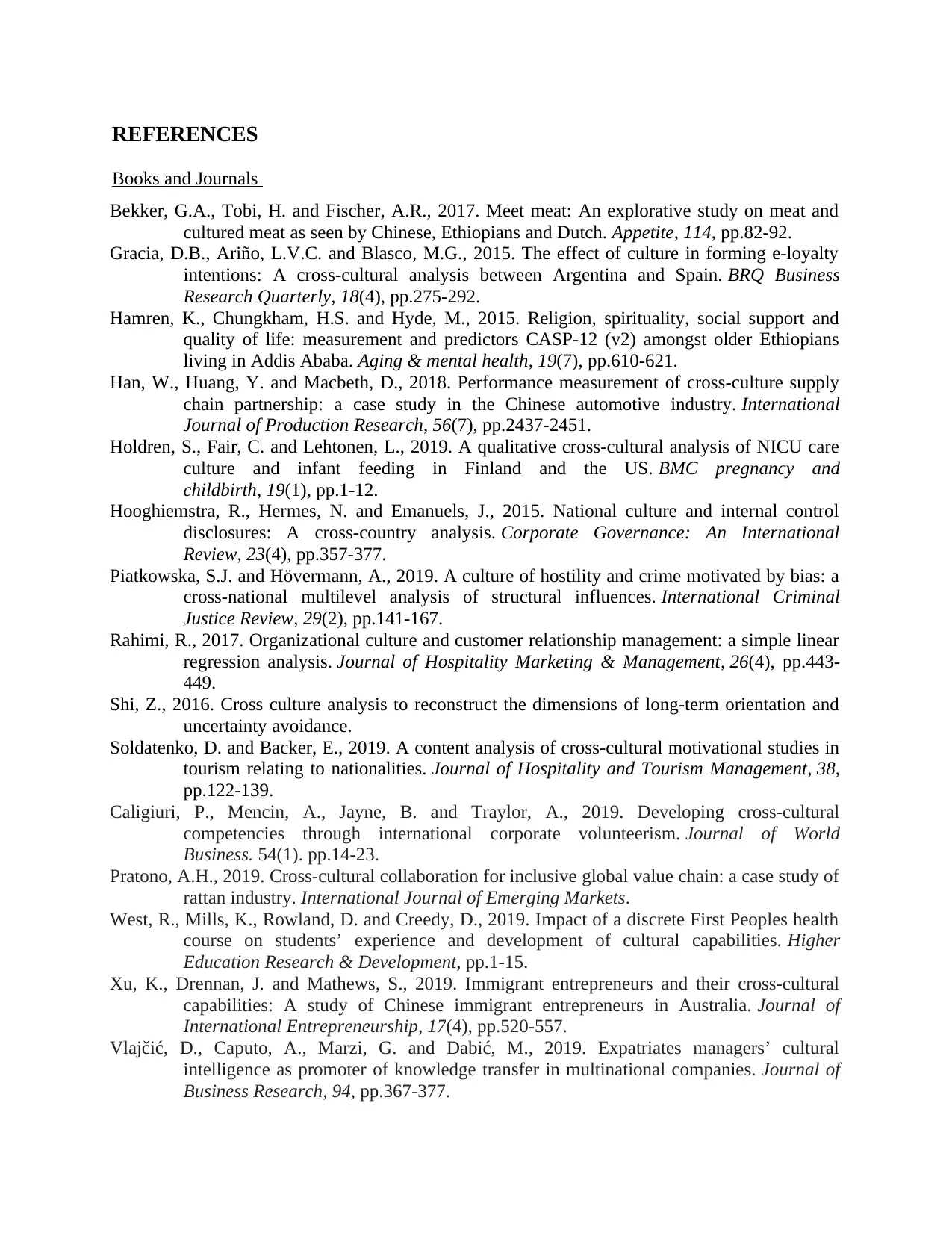
REFERENCES
Books and Journals
Bekker, G.A., Tobi, H. and Fischer, A.R., 2017. Meet meat: An explorative study on meat and
cultured meat as seen by Chinese, Ethiopians and Dutch. Appetite, 114, pp.82-92.
Gracia, D.B., Ariño, L.V.C. and Blasco, M.G., 2015. The effect of culture in forming e-loyalty
intentions: A cross-cultural analysis between Argentina and Spain. BRQ Business
Research Quarterly, 18(4), pp.275-292.
Hamren, K., Chungkham, H.S. and Hyde, M., 2015. Religion, spirituality, social support and
quality of life: measurement and predictors CASP-12 (v2) amongst older Ethiopians
living in Addis Ababa. Aging & mental health, 19(7), pp.610-621.
Han, W., Huang, Y. and Macbeth, D., 2018. Performance measurement of cross-culture supply
chain partnership: a case study in the Chinese automotive industry. International
Journal of Production Research, 56(7), pp.2437-2451.
Holdren, S., Fair, C. and Lehtonen, L., 2019. A qualitative cross-cultural analysis of NICU care
culture and infant feeding in Finland and the US. BMC pregnancy and
childbirth, 19(1), pp.1-12.
Hooghiemstra, R., Hermes, N. and Emanuels, J., 2015. National culture and internal control
disclosures: A cross‐country analysis. Corporate Governance: An International
Review, 23(4), pp.357-377.
Piatkowska, S.J. and Hövermann, A., 2019. A culture of hostility and crime motivated by bias: a
cross-national multilevel analysis of structural influences. International Criminal
Justice Review, 29(2), pp.141-167.
Rahimi, R., 2017. Organizational culture and customer relationship management: a simple linear
regression analysis. Journal of Hospitality Marketing & Management, 26(4), pp.443-
449.
Shi, Z., 2016. Cross culture analysis to reconstruct the dimensions of long-term orientation and
uncertainty avoidance.
Soldatenko, D. and Backer, E., 2019. A content analysis of cross-cultural motivational studies in
tourism relating to nationalities. Journal of Hospitality and Tourism Management, 38,
pp.122-139.
Caligiuri, P., Mencin, A., Jayne, B. and Traylor, A., 2019. Developing cross-cultural
competencies through international corporate volunteerism. Journal of World
Business. 54(1). pp.14-23.
Pratono, A.H., 2019. Cross-cultural collaboration for inclusive global value chain: a case study of
rattan industry. International Journal of Emerging Markets.
West, R., Mills, K., Rowland, D. and Creedy, D., 2019. Impact of a discrete First Peoples health
course on students’ experience and development of cultural capabilities. Higher
Education Research & Development, pp.1-15.
Xu, K., Drennan, J. and Mathews, S., 2019. Immigrant entrepreneurs and their cross-cultural
capabilities: A study of Chinese immigrant entrepreneurs in Australia. Journal of
International Entrepreneurship, 17(4), pp.520-557.
Vlajčić, D., Caputo, A., Marzi, G. and Dabić, M., 2019. Expatriates managers’ cultural
intelligence as promoter of knowledge transfer in multinational companies. Journal of
Business Research, 94, pp.367-377.
Books and Journals
Bekker, G.A., Tobi, H. and Fischer, A.R., 2017. Meet meat: An explorative study on meat and
cultured meat as seen by Chinese, Ethiopians and Dutch. Appetite, 114, pp.82-92.
Gracia, D.B., Ariño, L.V.C. and Blasco, M.G., 2015. The effect of culture in forming e-loyalty
intentions: A cross-cultural analysis between Argentina and Spain. BRQ Business
Research Quarterly, 18(4), pp.275-292.
Hamren, K., Chungkham, H.S. and Hyde, M., 2015. Religion, spirituality, social support and
quality of life: measurement and predictors CASP-12 (v2) amongst older Ethiopians
living in Addis Ababa. Aging & mental health, 19(7), pp.610-621.
Han, W., Huang, Y. and Macbeth, D., 2018. Performance measurement of cross-culture supply
chain partnership: a case study in the Chinese automotive industry. International
Journal of Production Research, 56(7), pp.2437-2451.
Holdren, S., Fair, C. and Lehtonen, L., 2019. A qualitative cross-cultural analysis of NICU care
culture and infant feeding in Finland and the US. BMC pregnancy and
childbirth, 19(1), pp.1-12.
Hooghiemstra, R., Hermes, N. and Emanuels, J., 2015. National culture and internal control
disclosures: A cross‐country analysis. Corporate Governance: An International
Review, 23(4), pp.357-377.
Piatkowska, S.J. and Hövermann, A., 2019. A culture of hostility and crime motivated by bias: a
cross-national multilevel analysis of structural influences. International Criminal
Justice Review, 29(2), pp.141-167.
Rahimi, R., 2017. Organizational culture and customer relationship management: a simple linear
regression analysis. Journal of Hospitality Marketing & Management, 26(4), pp.443-
449.
Shi, Z., 2016. Cross culture analysis to reconstruct the dimensions of long-term orientation and
uncertainty avoidance.
Soldatenko, D. and Backer, E., 2019. A content analysis of cross-cultural motivational studies in
tourism relating to nationalities. Journal of Hospitality and Tourism Management, 38,
pp.122-139.
Caligiuri, P., Mencin, A., Jayne, B. and Traylor, A., 2019. Developing cross-cultural
competencies through international corporate volunteerism. Journal of World
Business. 54(1). pp.14-23.
Pratono, A.H., 2019. Cross-cultural collaboration for inclusive global value chain: a case study of
rattan industry. International Journal of Emerging Markets.
West, R., Mills, K., Rowland, D. and Creedy, D., 2019. Impact of a discrete First Peoples health
course on students’ experience and development of cultural capabilities. Higher
Education Research & Development, pp.1-15.
Xu, K., Drennan, J. and Mathews, S., 2019. Immigrant entrepreneurs and their cross-cultural
capabilities: A study of Chinese immigrant entrepreneurs in Australia. Journal of
International Entrepreneurship, 17(4), pp.520-557.
Vlajčić, D., Caputo, A., Marzi, G. and Dabić, M., 2019. Expatriates managers’ cultural
intelligence as promoter of knowledge transfer in multinational companies. Journal of
Business Research, 94, pp.367-377.
Secure Best Marks with AI Grader
Need help grading? Try our AI Grader for instant feedback on your assignments.
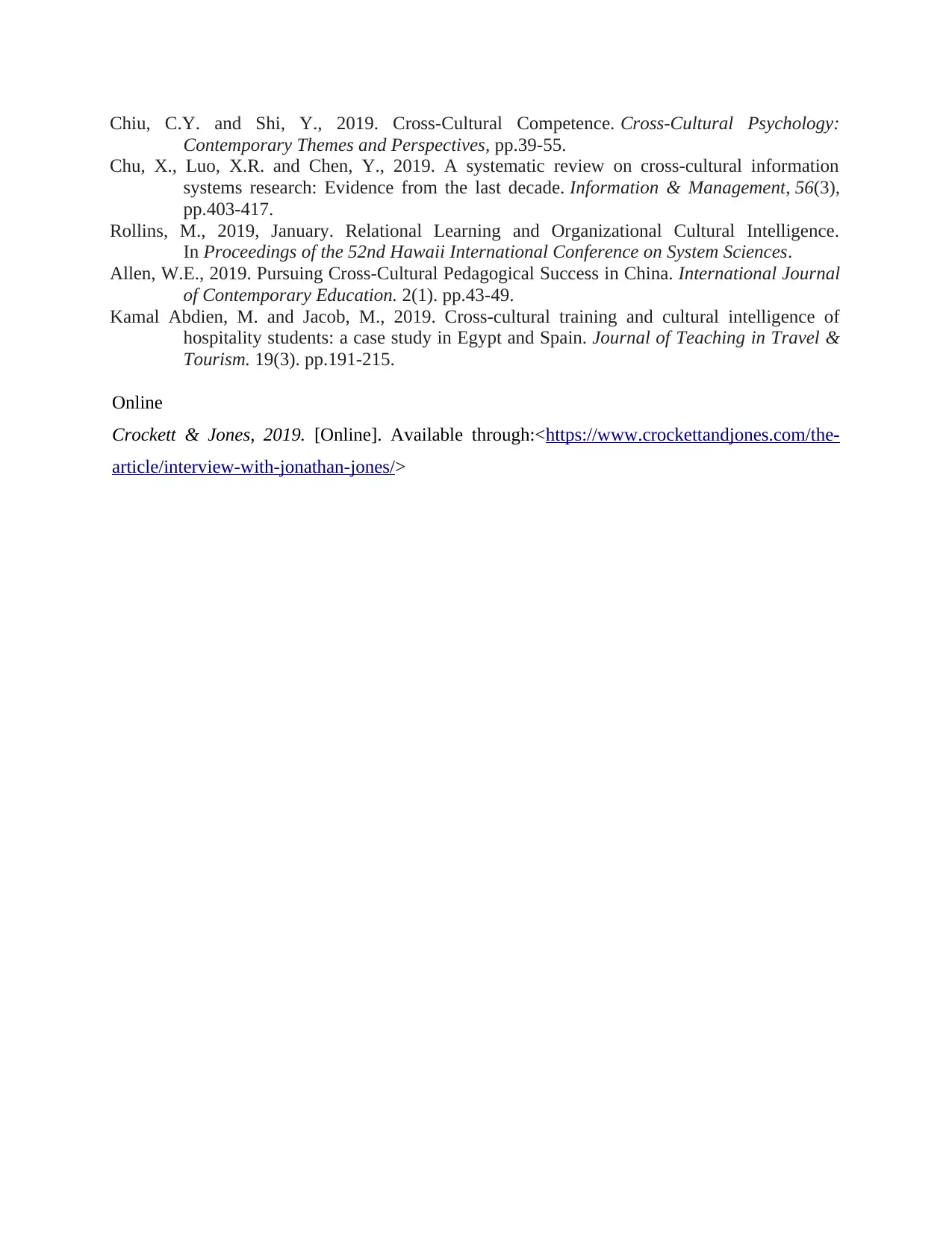
Chiu, C.Y. and Shi, Y., 2019. Cross‐Cultural Competence. Cross‐Cultural Psychology:
Contemporary Themes and Perspectives, pp.39-55.
Chu, X., Luo, X.R. and Chen, Y., 2019. A systematic review on cross-cultural information
systems research: Evidence from the last decade. Information & Management, 56(3),
pp.403-417.
Rollins, M., 2019, January. Relational Learning and Organizational Cultural Intelligence.
In Proceedings of the 52nd Hawaii International Conference on System Sciences.
Allen, W.E., 2019. Pursuing Cross-Cultural Pedagogical Success in China. International Journal
of Contemporary Education. 2(1). pp.43-49.
Kamal Abdien, M. and Jacob, M., 2019. Cross-cultural training and cultural intelligence of
hospitality students: a case study in Egypt and Spain. Journal of Teaching in Travel &
Tourism. 19(3). pp.191-215.
Online
Crockett & Jones, 2019. [Online]. Available through:<https://www.crockettandjones.com/the-
article/interview-with-jonathan-jones/>
Contemporary Themes and Perspectives, pp.39-55.
Chu, X., Luo, X.R. and Chen, Y., 2019. A systematic review on cross-cultural information
systems research: Evidence from the last decade. Information & Management, 56(3),
pp.403-417.
Rollins, M., 2019, January. Relational Learning and Organizational Cultural Intelligence.
In Proceedings of the 52nd Hawaii International Conference on System Sciences.
Allen, W.E., 2019. Pursuing Cross-Cultural Pedagogical Success in China. International Journal
of Contemporary Education. 2(1). pp.43-49.
Kamal Abdien, M. and Jacob, M., 2019. Cross-cultural training and cultural intelligence of
hospitality students: a case study in Egypt and Spain. Journal of Teaching in Travel &
Tourism. 19(3). pp.191-215.
Online
Crockett & Jones, 2019. [Online]. Available through:<https://www.crockettandjones.com/the-
article/interview-with-jonathan-jones/>
1 out of 11
Related Documents
Your All-in-One AI-Powered Toolkit for Academic Success.
+13062052269
info@desklib.com
Available 24*7 on WhatsApp / Email
![[object Object]](/_next/static/media/star-bottom.7253800d.svg)
Unlock your academic potential
© 2024 | Zucol Services PVT LTD | All rights reserved.





